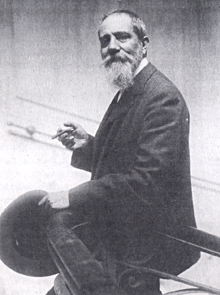Characters
Where am I? The famous people of Palena » Oreste Recchione
Oreste Recchione
Painter



Oreste Recchione was born in Sant'Angelo dei Lombardi, 30th September, 1841, his father is the palenese Orazio Recchione, while his mother Marianna Parzanese is from Ariano in Puglia. The couple lived for some time in Palena, but Oreste was born in Sant ' Angelo dei Lombardi, in the middle of a journey undertaken by the two to reach Ariano.
The family Recchione in Palena, is a prominent family, made rich with the manufacture of wool and in particular its role in transforming the wool. Oreste and his brothers lived relatively well-off in the beautiful residence adjoining the convent of St. Francis.
After early education with the canonical Caesar Falcocchio, Oreste is sent to study in Pescocostanzo where he plunges into an intellectual period, animated by the presence of Pietro Mosca, Francesco Zappi and Ottavio Colecchi. The painter Teofile Patine began to attend these early years.
In 1855 Oreste moved to Naples to complete his training, in 1856 entered the Accademia di Belle Arti in Naples, where he was already the friend Patini. Morelli and Palizzi are their artistic models of reference, representing their true objective.
Orestes does not forget his beloved Palena and in fact in 1860 is among the settlers of the town hall of Palena:. His life, therefore, is divided between the city on the Gulf and the small mountain town. In 1861, concludes his academic training and participates in the Promoter Napoletan since its first edition, an annual event which aimed to renew the system of Bourbon arts.
In 1870, in addition to the participating in the VII Promoter Napoletana, Oreste completes his piece of Sant' Andres pescatore, for the church of Our Lady of the Rosary of Palena. His works are numerous over time, punctuated by his participation in the Promoters, but since 1880, following the example del'amico Patini, Oreste Recchione feels stronger inspiration from his native land and so works such as An autumn evening between the mountains of Abruzzo (1881), the 'Avant-garde of the flocks -Abruzzo countryside (1883), The banks of the Sangro-nearing of the storm (1888).
In 1902, he completes the large altarpiece with The Holy Family, for the parish church of Palena. On November 10, 1904 Oreste Recchione died in Naples.


Oreste Recchione was born in Sant'Angelo dei Lombardi, 30th September, 1841, his father is the palenese Orazio Recchione, while his mother Marianna Parzanese is from Ariano in Puglia. The couple lived for some time in Palena, but Oreste was born in Sant ' Angelo dei Lombardi, in the middle of a journey undertaken by the two to reach Ariano.
The family Recchione in Palena, is a prominent family, made rich with the manufacture of wool and in particular its role in transforming the wool. Oreste and his brothers lived relatively well-off in the beautiful residence adjoining the convent of St. Francis.
After early education with the canonical Caesar Falcocchio, Oreste is sent to study in Pescocostanzo where he plunges into an intellectual period, animated by the presence of Pietro Mosca, Francesco Zappi and Ottavio Colecchi. The painter Teofile Patine began to attend these early years.
In 1855 Oreste moved to Naples to complete his training, in 1856 entered the Accademia di Belle Arti in Naples, where he was already the friend Patini. Morelli and Palizzi are their artistic models of reference, representing their true objective.
Orestes does not forget his beloved Palena and in fact in 1860 is among the settlers of the town hall of Palena:. His life, therefore, is divided between the city on the Gulf and the small mountain town. In 1861, concludes his academic training and participates in the Promoter Napoletan since its first edition, an annual event which aimed to renew the system of Bourbon arts.
In 1870, in addition to the participating in the VII Promoter Napoletana, Oreste completes his piece of Sant' Andres pescatore, for the church of Our Lady of the Rosary of Palena. His works are numerous over time, punctuated by his participation in the Promoters, but since 1880, following the example del'amico Patini, Oreste Recchione feels stronger inspiration from his native land and so works such as An autumn evening between the mountains of Abruzzo (1881), the 'Avant-garde of the flocks -Abruzzo countryside (1883), The banks of the Sangro-nearing of the storm (1888).
In 1902, he completes the large altarpiece with The Holy Family, for the parish church of Palena. On November 10, 1904 Oreste Recchione died in Naples.




